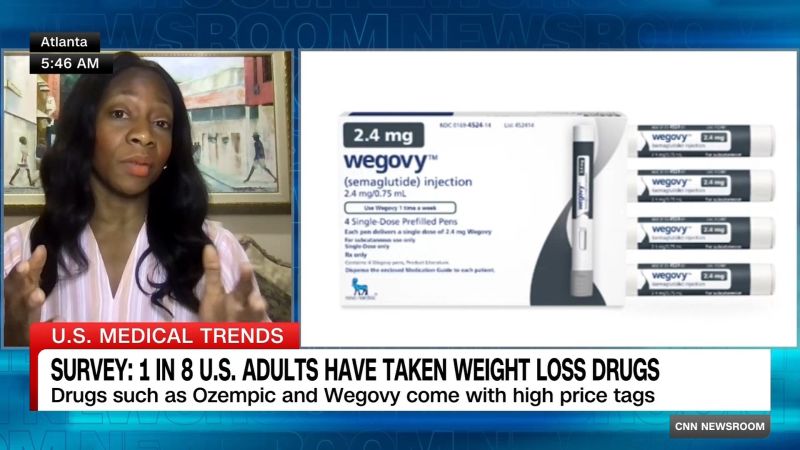The number of young people in the US who are prescribed GLP-1 agonist drugs like Wegovy and Ozempic for weight loss and diabetes soared 594.4% in just three years, according to new research.
Demand for these drugs has skyrocketed for people of all ages recently, but the study, which was published Wednesday in the journal JAMA, found that between 2020 and 2023, the number of prescriptions written for people ages 12 to 25 increased from 8,722 to 60,567.
Young women and adolescent girls had the biggest increase in the number of prescriptions.
The study looked information from a database that reports prescriptions from more than 93% of retail pharmacies in the United States, although the data cannot capture what exactly the prescriptions were intended to treat and whether the patient actually used the medications.
For context, the study authors also looked at prescription trends for other medications and found that there was a 3% decrease in the prescription of other drugs for this age category during this same time period.
The study looked at Ozempic (which uses the active ingredient semaglutide), Trulicity (dulaglutide) and Byetta (exenatide), which are approved to treat type 2 diabetes and can help with weight loss, and Saxenda (liraglutide) and Wegovy (semaglutide), which are approved for weight management. Each can be prescribed for children as young as 10 or 12. Tirzepatide, sold as Zepbound and Mounjaro, is approved only for adults.
The authors from the University of Michigan Medical School and Yale University said that, given how many young people are being prescribed these medications, efforts to promote safe and appropriate prescribing should include endocrinologists, doctors who practice family medicine and nurse practitioners.
Obesity and type 2 diabetes are affecting an increasing number of young people. The number of people ages 10 to 19 with type 2 diabetes doubled just over the past two decades in the US, a 2023 study found. The study predicted that by 2060, the number of young people with type 2 diabetes will increase 673%.
Obesity is also a significant problem for young people in the US, where the average young adult is now overweight, according to a 2023 study. About 1 in 6 adolescents is overweight, and almost 1 in 5 has obesity, studies show. Obesity alone affects 14.4 million children and teens in the US.
Having obesity as a young person significantly increases a person’s chance of weight problems when they are older, research shows. Obesity and overweight can also be a significant risk factor for other health conditions like heart disease, kidney problems and even cancer, studies show, in additional to mental health conditions.
Dr. Melanie Cree, a pediatric endocrinologist at Children’s Hospital Colorado who has been working with this class of medication in clinical trials with children for almost a decade, says the drugs have been a game-changer not just to help kids lose weight and lower blood sugar, but also to lower liver fat and improve cardiac and kidney function – “all of those conditions that go with type 2 diabetes.”
“So it’s not only that they’re lowering blood sugars. It’s that they appear to be decreasing the complications that we see from type 2 diabetes, so that they’re really affecting multiple aspects,” said Cree, who was not involved with the new study. “They’re really changing the face of what diabetes looks like in an individual and in the field of diabetes across the board.”
The American Academy of Pediatrics updated its guidelines for managing obesity last year and said that, in addition to behavior and lifestyle treatments for the whole family, the use of weight loss medications is appropriate for children 12 and over.
Cree said she sees few downsides to these drugs. Some of her patients have had to stop taking them or can’t take as much because of side effects like nausea, and she’d like to see more research on that topic.
When her patients can get access, Cree said, the positive changes have been significant. Many have experienced “profound” weight loss, she said, transforming their lives.
The most significant downsides have nothing to do with the physical impact of the medications; rather, it’s that the medicine can be expensive and many of her patients can’t get insurance to cover the cost, particularly if they’re used for weight loss. Additionally, many patients have had a hard time filling prescriptions because of drug shortages.
One parent of a child who lost a significant amount of weight told Cree that the medicine gave her her daughter back.
“I had another girl who, after some weight loss, went to prom last fall, and it was the first dance she had ever gone to, because it was the first time she felt comfortable wearing a dress,” Cree said. “So really, really poignant stories from these adolescents. I just feel privileged to be a part of their life and be able to share in these transformations and moments with them.”

